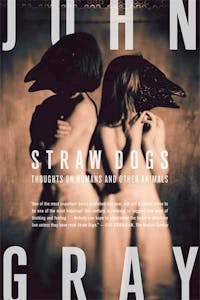Straw Dogs
Thoughts on Humans and Other Animals
 Download image
Download image
ISBN10: 0374270937
ISBN13: 9780374270933
Trade Paperback
272 Pages
$19.00
The British bestseller Straw Dogs is an exciting, radical work of philosophy, which sets out to challenge our most cherished assumptions about what it means to be human. From Plato to Christianity, from the Enlightenment to Nietzsche and Marx, the Western tradition has been based on arrogant and erroneous beliefs about human beings and their place in the world. Philosophies such as liberalism and Marxism think of humankind as a species whose destiny is to transcend natural limits and conquer the Earth. John Gray argues that this belief in human difference is a dangerous illusion and explores how the world and human life look once humanism has been finally abandoned. The result is provocative and sometimes disturbing book that leads the reader to question our deepest-held beliefs.
Reviews
Praise for Straw Dogs
"One of the most important books published this year, and will probably prove to be one of the most important this century. An attempt to suggest new ways of thinking and feeling . . . nobody can hope to understand the times in which we live unless they have read Straw Dogs."—Sue Corrigan, Mail on Sunday
"The book, which cites an abundance of philosophers, scientists, and writers from ancient times to days, is relentlessly clear about its theme: The aim of life should be not to change the world ‘but to see it rightly' . . . You will love Straw Dogs."—David Berreby, On Earth
"At once daunting and enthralling, Gray's remarkable new book shows us what it would be like to live without the distraction of consolations."—Adam Phillips
"This powerful and brilliant book is an essential guide to the new Millennium. Straw Dogs challenges all our assumptions about what it is to be human, and convincingly shows that most of them are delusions."—J.G. Ballard
"In a work of thoroughgoing iconoclasm, British philosopher Gray attacks the belief that humans are different from and superior to animals. Invoking pure Darwinism, he savages every perspective from which humans appear as anything more than a genetic accident that has produced a highly destructive species (homo rapiens)—a species that exterminates other species at a phenomenal rate as our swelling numbers despoil the global environment. Gray explains the human refusal to confront the darker realities of our nature largely as the result of how we have consoled ourselves with the myths of Christianity and its secular offspring, humanism and utopianism. Human vanity, he complains, has even converted science (which should teach us of our insignificant place in nature) into an ideology of progress. But neither hope for progress nor confidence in human morality passes muster with Gray, who envisions a future in which the human population finally contracts as a world politics that grows ever more predatory and brutal shatters all such illusions. As a work of ruthless rigor, this provocative book will force readers to reexamine their own convictions."—Bryce Christensen, Booklist
"'Humans think they are free, conscious beings, when in truth they are deluded animals,' writes London University economics professor Gray in a series of brief and intriguing mini-essays. His themes include the similarities between hypnotism and financial markets and uncomfortable truths behind drug use and its prohibition. In a chapter called Deception, Gray traces Humanism from Plato through Postmodernism. He critiques both science and religion: Science can advance human knowledge, it cannot make humanity cherish truth. Like the Christians of former times, scientists are caught up in the web of power; they struggle for survival and success; their view of the world is a patchwork of conventional beliefs . . . He tears down institutions, especially consciousness, self, free will and morality, and questions our ability to solve the problems of overpopulation and overconsumption: Only a breed of ex-humans can thrive in the world that unchecked human expansion has created . . . Gray recommends a devaluation of progress, mastery, and immortality, and a return to contemplation and acceptance: Other animals do not need a purpose in life. Can we not think of the aim of life as being simply to see? This comforting question punctuates an otherwise profoundly disturbing meditation on humankind's real place in the world."—Publishers Weekly



